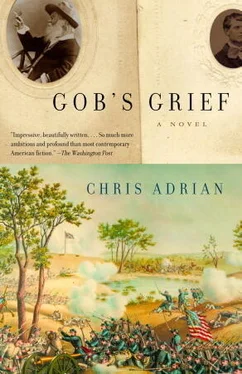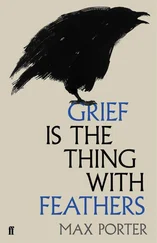“Dr. Walker is doing as I have asked her,” said Woodhull. “Ipecac and calomel are to be withheld in all cases of flux and diarrhea.”
“For God’s sake, why?” asked Dr. Bliss, his face reddening. He was new in Armory Square. Earlier that same day Woodhull had castigated him for not cleaning a suppurating chest wound.
“Because it is for the best,” said Woodhull. “Because if you do it that way, a boy will not die. Because if you do it that way, some mother’s heart will not be broken.”
Dr. Bliss turned redder, then paled, as if his rage had broken and ebbed. He scowled at Dr. Walker, turned sharply on his heel, and left. Dr. Walker sat down.
“Buffoon,” she said. Woodhull poured whiskey for her, handed her the glass, then took a rag and began to knock the lint from her second lieutenant’s shoulder straps. It was an open secret in the hospital that they were married in all but name.
“Dr. Walker,” said Woodhull, “why don’t you tell Mr. Whitman about your recent arrest?”
The woman sipped her whiskey and told how she’d been arrested outside of her boardinghouse for masquerading as a man. Walt only half listened to her talk. He was thinking about diarrhea. It was just about the worst thing, he had decided. He’d seen it kill more boys than all the minié balls and shrapnel, and typhoid and pneumonia, than all the other afflictions combined. He’d written to his mother: War is nine hundred and ninety-nine parts diarrhea to one part glory. Those who like wars ought to be made to fight in them. And sometimes, up to his neck in sickness and death, he did believe that the war was an insufferable evil, but other times it seemed to be gloriously necessary, and all the blood and carnage and misery a terrible new beginning that was somehow a relief to him.
“I did my best to resist them,” said Dr. Walker, “and I shouted out, ‘Congress has bestowed on me the right to wear trousers!’” She held out her cup for more whiskey, and shook her head sadly at Walt. “But it was to no avail.”
In the summer, Walt saw the President almost every day. He lived on the route Mr. Lincoln took to and from his summer residence north of the city, and walking down the street, soon after leaving his rooms in the morning, he’d hear the approach of the party. Always Walt stopped and waited for them to pass. Mr. Lincoln dressed in plain black and rode a gray horse. He was surrounded by twenty-five or thirty cavalry with their sabers drawn and held up over their shoulders. They got so they would exchange bows, he and the President, Walt tipping his broad, floppy gray felt hat, Lincoln tipping his high stiff black one, and bending a little in the saddle. And every time they did this Walt had the same thought: A sad man.
With the coming of the hot weather Dr. Woodhull redoubled his efforts to eradicate noxious effluvia. He ordered the windows thrown open, and burned eucalyptus leaves in small bronze censers set in the four corners of each ward. The eucalyptus, combined with the omnipresent acrid reek of Labarraque’s solution, gave some of the boys aching heads, for which Dr. Woodhull prescribed whiskey.
“I want a bird,” Hank Smith said one day in July. Walt had brought several bottles of blackberry and cherry syrup, mixed them with ice and water, and delivered the delicious concoctions to the boys, along with the news from Gettysburg. Hank was uninspired by Meade’s victory. He was in a bad mood.
“I’ve been here forever,” he said. “And I am going to be here forever.” He had been fighting a bad fever for a week. “Nonsense,” Walt said, and helped him change out of his soaked shirt, then wiped him down with a cool wet towel. The shirt he took to the window, where he wrung out the sweat, watching it fall and dapple the bare ground. He laid the shirt to dry on the sill, and considered his damp, salty hands. In the distance Walt could see the Capitol, magnificent even under scaffolding.
“I want a bird,” Hank said again. “When I was small, my sister got me a bird. I called it after her — Olivia. Would you help me get one?” Walt left the window and sat on a stool by the bed. The sun lit up the hair on Hank’s chest, and called to Walt’s mind shining fields of wheat.
“Did you read my book?” Walt asked him, because he’d finally given Hank a copy, inscribed to my dear dear dear dear boy. Walt had had a dream, a happy one at last. Hank, transformed by Walt’s words, had leaped out of bed, wound gone, typhoid gone, had shaken Walt by his shoulders, and had shouted “Camerado!” so loud the Capitol dome rang like a bell, and all the boys all over the country had put down their guns and embraced each other in celebration of that beautiful word.
“I fingered it a little. But a bird, wouldn’t that be fine?”
“I could get you a bird,” Walt said after a moment. “Though I don’t know where from.”
“I know where,” said Hank, as Walt helped him into a new shirt. With a jerk of his head Hank indicated the window. “There’s plenty of birds out in the yard. You just get a rock and some string.”
Walt came back the next day with rock and string, and they set a trap of breadcrumbs on the windowsill. Crouching beneath the window, Walt grabbed at whatever came for the crumbs. He missed two jays and a blackbird, but caught a beautiful cardinal by its leg. It chirped frantically and pecked at his hand. The fluttering of its wings against his wrists made him think of the odd buzz that still thrilled his soul when he was on the wards. He brought the bird to Hank, who tied the string to its leg, and the rock to the string, then set the rock down by his bed. The cardinal tried to fly for the window, but only stuck in midair, its desperate wings striking up a small breeze that Walt, kneeling near it, could feel against his face. Hank clapped and laughed.
Hank called the bird Olivia, though Walt pointed out that it was not a female bird. The female of the species was dun and dull, he said, but Hank seemed not to hear. Olivia became the ward’s pet. Other boys would insist on having him near their beds. It did not take the bird long to become domesticated. Soon he was eating from Hank’s hand, and sleeping at night beneath his cot. They kept him secret from the nurses and doctors, until one morning Hank was careless and fell asleep with him out in the middle of the aisle while Dr. Woodhull was making his rounds. Walt had just walked on the ward, his arms full of candy and fruit and novels.
“Who let this dirty bird into my hospital?” Woodhull asked. He very swiftly bent down and picked up the stone, then tossed it out the window. Olivia trailed helplessly behind it. Walt dropped his packages and rushed outside, where he found the bird in the dirt, struggling with a broken wing. He put him in his shirt and took him back to his room, where he died three days later, murdered by the landlady’s cat. Walt told Hank that Olivia had flown away. “A person can’t have anything,” Hank said. He called Olivia a bad bird, and growled for a week about his faithlessness.
* * *
At Christmas, Mrs. Hawley and her cronies trimmed the wards, hanging evergreen wreaths on every pillar, and stringing garlands across the hall. At the foot of every bed, they hung a tiny stocking, hand-knitted by Washington society ladies. Walt went around stuffing them with walnuts and lemons and licorice.
Hank’s leg got better and worse, better and worse. Walt cornered Dr. Woodhull and said he had a bad feeling about Hank’s health. Woodhull insisted he was going to be fine; Walt’s fretting was pointless.
Hank’s fevers waxed and waned, too. One night, Walt came in from a blustery snowstorm, his beard full of snow. Hank insisted on pressing his face into it, saying it made him feel so much better than any medicine had, except maybe paregoric, which he found delicious, and which made him feel he was flying in his bed.
Читать дальше












